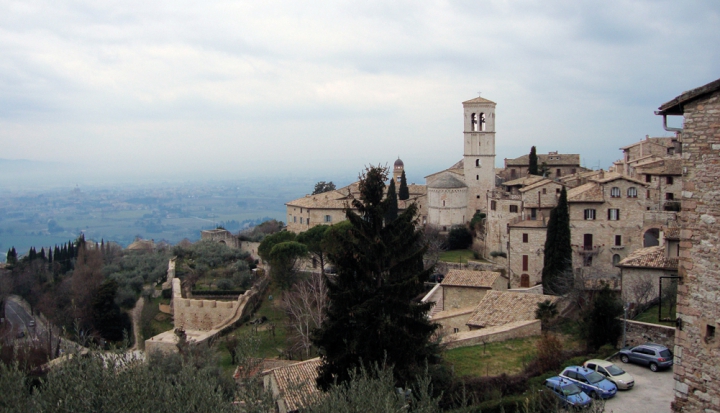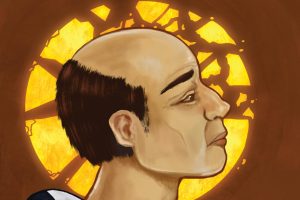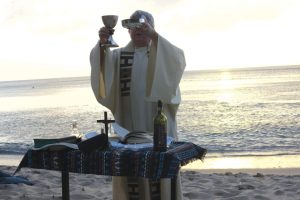As a tour guide, Rick Steves directs travelers to hotels, restaurants, and museums in Europe, but he points them to God in the developing world.
Rick Steves says his journey as a travel writer follows Abraham Maslow’s hierarchy of needs. He started with “Rick’s travel hierarchy of needs,” he says: “Eating and sleeping on a budget, staying healthy, not getting ripped off, catching the train.”
Steves’ best-selling Europe Through the Back Door guidebooks and PBS shows still cover the basics, but in the 1990s he extended his expertise into art, history, and culture. And in the past decade he has continued to move up the hierarchy to “more fulfilling and altruistic” ideas. “Since September 12, 2001 my focus has shifted,” Steves says. “I didn’t plan it this way, but my heart took me that way, into travel as a political act.”
When he addresses church groups, Steves, who is Lutheran, uses “spiritual” instead of “political” to talk about traveling in the developing world. His time in Catholic Central America has been influential, and he has also produced videos for the Evangelical Lutheran Church in America (ELCA) about faithful travel and church ministry in Papua New Guinea.
Political or spiritual travel, Steves explains, means “traveling in a way that gets you out of your comfort zone. It teaches you empathy and lets you come home with a broader perspective.”
“I find it very gratifying to stand in front of 500 generally frightened Americans,” he says, “and tell them what I’ve learned from spending a third of my adult life living out of a carry-on suitcase.”
Why should Americans travel?
There’s a famous quote: “Living life without traveling is like having a great book and never turning the page.” I believe in traveling as a way to get to know God’s family. God made this great creation, and it’s peopled with all sorts of interesting cultures and ways of life. When you travel, you kind of carbonate your existence. It’s like a swizzle stick for life.
There’s a lot of fear in our society, and when you travel you overcome fear. I travel so I can hang out with people who find different truths to be self-evident and God-given. And I learned that it makes sense to give everybody a little wiggle room. I can weave together different tastes and lifestyles and cultural fortes, and create a hybrid of my own.
I travel because it makes me more thankful to get home. I travel to better understand where I am from and my own culture because I can see it with more contrast from a distance. It really helps me appreciate my beautiful corner of the world.
Does travel always have this impact on people?
You can travel in a way that brings people closer together and builds understanding, or you can travel in a way that exacerbates the differences between the rest of the world and us.
There are lousy travelers and good travelers. Lousy travelers don’t learn anything. Lousy travelers waste time and money. Lousy travelers are demanding and ethnocentric.
Good travelers fit in and learn. Good travelers take home the ultimate souvenir, and that is a broader perspective and empathy for other people.
You don’t need to be a saint in your travels. For instance I have no problem with cruises, but on a cruise, it’s easy to be more interested in hedonism than in bringing our world together. And if you travel in a way that doesn’t better connect you with our world, that’s a lost opportunity.
What do you learn from “good traveling”?
This is what I call travel as a political act. Americans are 4 percent of the planet. Travel allows us to develop more empathy for the other 96 percent of the planet, especially the 50 percent of humanity that’s trying to live on less than $2 a day.
Lately we’ve conned ourselves into thinking we’re having a financial crisis, but we are, by any measure but our own, really wealthy and living lives of incredible abundance. I don’t want to belittle anybody’s hardships if they’re unemployed, but we are by no means in desperate straits in the United States. And if we are in any kind of desperate straits, it’s a matter of distribution of wealth, not how much wealth is within this society.
When people travel, they gain a better appreciation for the gap between the haves and the have-nots, both within our society and between our society and the rest of the world.
What holds Americans back from choosing meaningful travel experiences?
Anybody can go to Iran if they want to. Anybody can go to Turkey or Morocco or to the developing world. I just interviewed a woman who went around the world in one year, spending a month volunteering in 12 different places.
Thoughtful travel is not advertised as part of mainstream tourism. The travel industry wants you, the traveler, to spend your money here, not there. It’s simple business. The casinos and the resorts are promoted, but the free ruined castles aren’t. Nobody makes money off something that’s free. The best travel experiences are not necessarily what’s promoted.
When my family went to Mazatlán, a Mexican city with a lot of resorts, we took a bus into town, walked into the poor side of the town, and met real people. You can just take a left turn instead of a right turn, but you need to make a choice.
People think it’s risky. People are afraid, and I think deep down people don’t want to know what’s out there. I didn’t want to know about the Sandinistas when I first went to Central America, but I decided it’s wrong for me not to want to know about the struggle of poor landless peasants in Central America. So I went, knowing it would complicate my life.
Thomas Jefferson wrote that travel makes a person wiser if less happy. I knew my travels would make me less happy, but I also knew it was right for me to know people on the receiving end of my country’s trade policy. I wanted to know. And when I came back, I wrote a journal called, “There’s blood on your banana,” and I gave it to every congressional office in Washington. It was futile, but I just had to do it.
Is that what you mean by travel being “political”?
When I give that talk in a church context, I call it travel as a spiritual act, and then I can talk more openly about faith issues.
Travel as a political or spiritual act means implementing the global perspective gained from travel as a citizen of the greatest and most powerful democracy on earth.
In the privacy of the voting booth, I can’t just vote for my own financial interest. As a Christian I consider how this election impacts struggling people, and in a lot of cases what’s best for me is not what’s best for struggling people. I try to vote as Jesus would.
That puts many Americans in a difficult ethical bind. I’m haunted by the fact that good Christian Americans vote only for their own short-term financial and material interest.
So spiritual to you doesn’t meanvisiting churches or communing with nature.
I really believe that the Bible is concerned about economic justice.
Rich Christians read the Bible through First World eyes, while poor Christians read the Bible through Third World eyes. Americans read the Bible in a way that makes us feel good without dealing with the reality that we ignore the desperately poor. Jesus cared about the poor and said some pretty harsh things about economic justice.
This year some Christians said that our budget crisis is more important than desperate people in Japan after the tsunami. Probably half of the Christians in America, including Catholics, think we should cut foreign aid because they believe we are in economic crisis.
If people are just motivated by greed and have no personal faith at all, that’s their own problem, but many Christians need a caring but straighttalking friend to explain economic justice issues to them.
There are vast rice fields in Haiti going unplanted today because roadside stands sell rice imported from the United States at a price that no Haitian farmer could ever compete with because of U.S. government subsidies. That is a type of structural poverty.
I don’t see a lot of leadership in mainstream politics or Christian pulpits when it comes to taking seriously Jesus’ preferential option for the poor.
Do you have any concerns about “poverty tourism”?
That’s voyeurism, and it’s grotesque. I see this as an issue of stewardship. To go on a nice trip, I may be spending five years’ wages for the bread earner of a family in the country I am traveling in. I have every right to do that, but it’s not good stewardship unless I go home with empathy for that bread earner.
It’s beautiful stewardship for a rich American Christian to go to a poor country and not give them stuff but exchange passions for life and insights and fun—and humanize each other. They better understand us. We better understand them. We see that we have more in common than not. And then when you go home, you talk it up.
I struggled with this issue of stewardship a lot when I was traveling in Central America in the 1980s. We decided that if we spread the word with our educational tour, then it would be good stewardship.
If a family can’t afford international travel, is it possible to go on meaningful trips in the United States?
Sure. When you travel, you gain an appreciation for nature, for culture, for history, and for people.
You don’t need to go to Switzerland to gain an appreciation for nature. You can just rent an inner tube and float down a river. You and your child can ponder the constellations reflected on a mountain lake.
There are wonderful, affordable opportunities to gain insight into other cultures in our country, whether immigrant cultures or just American cultures. I’m always impressed by the diversity in this country.
There’s stirring history in the United States. You could create a trip around the Civil War, American independence, the history of flight, Chinese immigrants, or the gold rush.
I just went to the World Food Prize in Des Moines, Iowa for a three-day weekend. For me that was a vacation, and it was cheap. I met former United Nations General Secretary Kofi Annan and the heads of the Heifer Project and Bread for the World. I had an incredibly inspirational time hanging out with people whose passion is dealing with hunger on this planet. Anybody can go, but nobody does. People don’t think of something like this as a vacation.
You have that same opportunity to get out of the box and meet people here as in other countries. It would really be good for me to see more of America. It’s just a little more rewarding to go to countries that are more different yet.
What insights have you gained from traveling to the Muslim world?
I was on the top of the Rock of Gibraltar looking out at Africa from Europe recently, and I looked at the tide drifts where the Mediterranean hits the Atlantic. The tide drifts make it dangerous, but they also make it fertile: Lots of plankton and small fish are brought together with bigger fish, fishermen, and birds.
Then I thought about the two cultures coming together just like the two continents. When Christendom and Islam come together, as they have for 1,300 years at that spot, there’s going to be rubbing, like cultural tectonic plates, and it’s understandable.
We just need a few people who can challenge us to rise above the fear and hate, and try to build more bridges and fewer walls. When done right, travel is a very constructive activity, and I’m thankful and proud to be part of it. It gives me energy.
Turkey is a wonderful place for Americans to get a balanced look at Islam. I once brought 20 Americans on a cultural exchange to a small town there. We were dancing in the living room of the mayor, and he pulled me over to show me his Qur’an bag.
Every house has a Qur’an bag, and it’s a special part of the house. And he said, “In my Qur’an bag I keep a copy of the Bible, the Torah, and the Qur’an because we Christians, Jews, and Muslims are all people of the book, children of the same God.”
What a beautiful thing! I celebrate it when I can find a little glimpse of hope that we all worship the same God, and that God loves us all.
A travel writer today is a lot like a medieval jester back in feudal Europe. His job was to leave the palace and find out what the ordinary people were talking and joking about.
In a lot of ways we’re in the castle, and travelers can go out and find out what it’s like. Then we can come home and tell people Muslims are not all violent fanatics. They’re beautiful people. In fact there’s a billion of them, and they’re certainly not going away.
How does Europe fit into travel as a political act?
It’s not the most challenging travel, but it gets you comfortable with the fact that everybody doesn’t have the American dream, and that smart people find different truths to be self-evident.
It’s healthy for Americans to check it out—it’s our heritage for many of us. I think of Europe as a wading pool for world exploration. If you have a good trip there, you may go to sub-Saharan Africa, Asia, or someplace else, I hope.
As far as spiritual travel experiences go, how do you compare visiting developing countries with visiting European sites such as the Vatican?
Last Christmas I went to Managua, Nicaragua to go to Midnight Mass with Father Ernesto Cardenal, who has gotten in trouble for being too political. He gave me a beautiful hug, and it brought me to tears. Here’s a man who dedicated his life to standing for justice for the poor in the context of his Christian faith. It was the greatest Christmas Mass that I could have had.
I see and feel “what you do to the least of these, you do to me” in Central America from not only the leadership of the church but the actual congregations. To me there’s something odd about how rich Christians live with a mindset of scarcity and poor Christians live with a mindset of abundance, trusting that God will take care of them, that their loving Father will not abandon them. Walking with the people in a religious context, in the Catholic context in Central America, is really an inspiration.
When I go to Europe, I try to see medieval churches, whether Protestant or Catholic, in their historical context. They are marks of a society’s dedication to its faith, and it’s quite a cool thing to think that people dedicated their lives to those churches knowing they would never see them actually finished and worshiped in.
For years I used to get angry taking tourists to the Vatican, but I realized that I needed to check my Protestant sword at the door. You can think about how much money was diverted from real people’s needs but that’s not constructive.
St. Peter’s Basilica is baroque, and it was the greatest way that people could honor and glorify God in the era that it was built. In that context it is the greatest church in Christendom.
A highlight for me is to go to Mass there and think of all of the faith and love and dedication to the teachings of Jesus that we crazy humans have grappled with and enjoyed and shared and designed over all these centuries in that church. Central America and the Vatican are both inspirations in their own unique ways.
This article appeared in the June 2011 issue of U.S. Catholic (Vol. 76, No. 6, pages 18-22).
Image: Photo courtesy of Rick Steves














Add comment